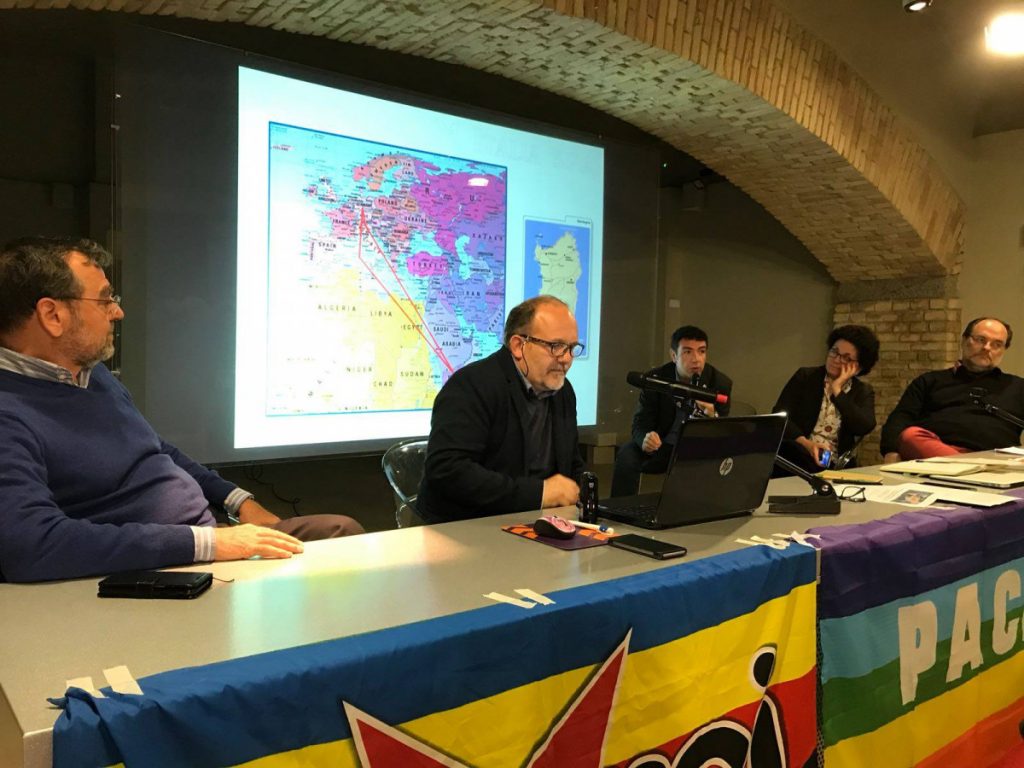
Workshop
The battle for peace, legality, and sustainable employment in Sardinia continues
What is being fought in Sardinia is a real battle: it seems a contradiction but living for peace, brotherhood, employment, and legality, sometimes means fighting.
We have already reported on several occasions on the RWM Conversion Committee for Peace and Sustainable Employment and its initiative to convert a bomb factory in Sulcis Iglesiente. An initiative that is going through a very difficult time.
A few days ago, as Carlo Cefaloni wrote, Multi-Desk of Productive Activities of Iglesias authorized a measure that allows RWM Italia SPA to build two new production departments that will allow the company to triple the current production of bombs for airplanes. That is to say, to go from 5/8,000 bombs produced annually to more than 20,000 bombs.

A huge amount that will involve more and more the town of Iglesias and the rest of Sardinia, with their public institutions and their citizens, in the countless world conflicts supported by the arms market, especially in the Middle East.
In mid-November there was yet another warning from the European Parliament, shocked by the amount of war weapons of European production found in the arsenals of Daesh and by the fact that many European States, including Italy, continue to export weapons to countries such as Saudi Arabia, which, under the Treaties, should be subject to embargo. Then, we should not forget about the widespread indignation recorded on the occasion of the assassination of journalist Kashoggi in the Saudi Consulate of Istanbul and the consequent stance taken by many States against the ruthlessness of Saudi Arabia.
It is therefore a delicate moment, from many points of view, and the Committee wonders how a decision could be taken, inside a municipal office, without the public involvement of the democratic institutions, to allow the company that supplies a large quantity of bombs to the Saudi State in the war in Yemen, to grow in this way.
In recent months, the RWM Conversion Committee and “Italia Nostra Sardegna” have raised numerous concerns with the Iglesias municipal administration regarding the environmental compatibility of the project and the fairness of the operation from a legal point of view.
Before the war, Yemen was a region that attracted tourists from all over the world. Writer Pierpaolo Pasolini called it “the most beautiful country in the world” in the 1960s. Its capital city, Sana’a, was declared a UNESCO World Heritage Site. Its current situation shows that if we do not pursue policies of peace and sustainable development, war is around the corner: values are lost, beauty is distorted and tourism becomes a mirage. The same thing could happen for Sardinia.
It is worth noting, in fact, that the area covered by the settlement is located near the town centre, in a wooded area close to the Site of Community Interest Marganai – Monte Linas. Tripling the production will inevitably mean multiplying also the risks for the environment due to the polluting emissions of the factory and to the constant traffic of heavy vehicles loaded with explosive and toxic substances that will be crossing in triple quantities the roads, ports, and airports of Sardinia in and out, given that, in addition to exporting from the island all the production, the plant needs to regularly import the substances used for the packaging of bombs.
The RWM Committee for Peace and Sustainable Employment has therefore declared: ” We would thus start to surrender our territory once again to an economy of death, characterizing Sulcis Iglesiente as a land of bombs instead of a land of sustainable development and peace, as it could be with a forward-looking policy. We give our reputation and our future in exchange for a bulk of jobs whose revenues are small compared to those of the company heavily involved in the war in Yemen, which will follow the market and when it deems it appropriate, regardless of our needs, will leave here yet another useless shell. ”
The RWM Conversion Committee and Italia Nostra Sardegna, while continuing to hope for a reconsideration by the City of Iglesias – also because they believe that the authorization would be issued by pushing the law and with numerous legal vices – are asking local policy, regional, national, as well as religious and moral authorities, to intervene in support of a solution that averts all this and relieves the territory from involvement in a conflict defined by the UN as the worst humanitarian catastrophe of this century.



